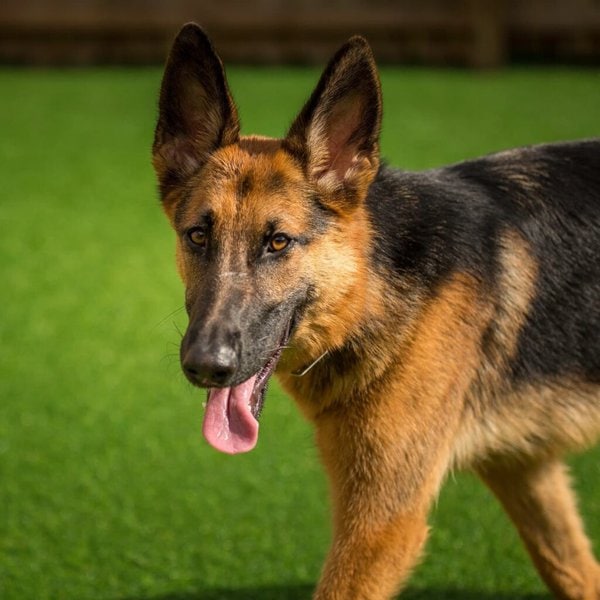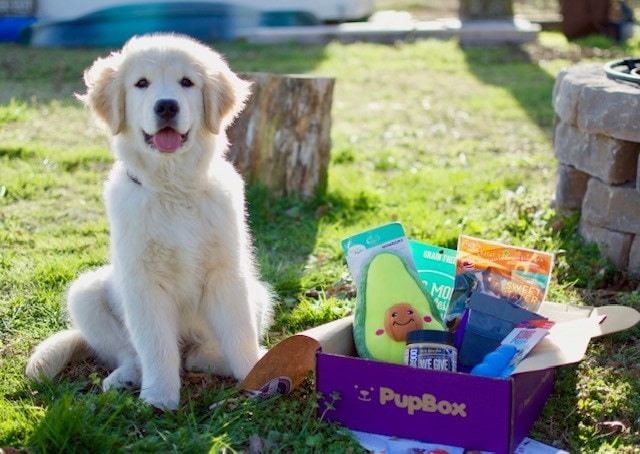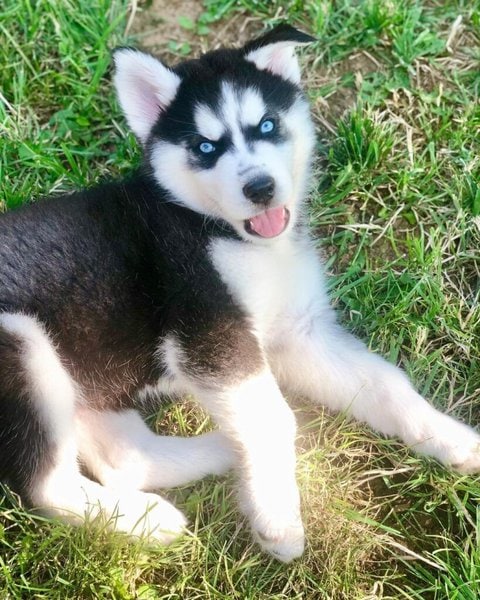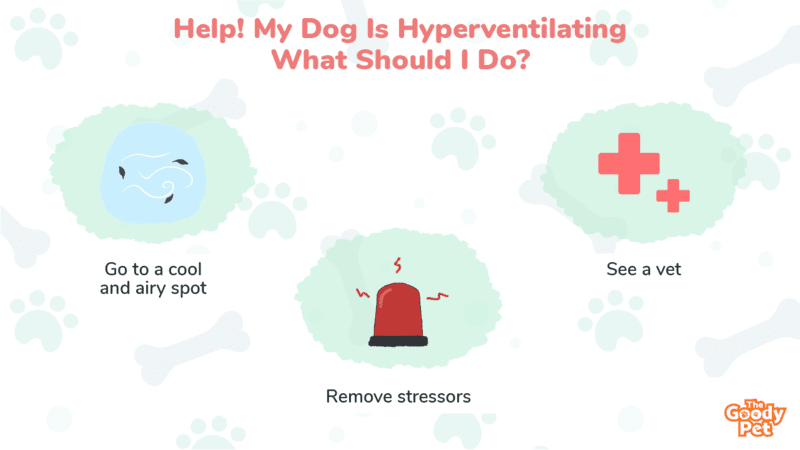As a dog owner, one of the most unnerving things to witness is your dog hyperventilating. So what exactly is hyperventilating? What causes it? And most importantly, what can you do about it.
Hyperventilating occurs when a dog takes fast, labored breaths. It can either be a sign of issues in the respiratory system or systemic issues manifesting in respiratory distress. Here are some of the main causes of this abnormality.
- Reverse sneezing
- Asthma
- Anxiety
- Allergies
- Heat and exercise intolerance
- Pain
- Metabolic derangements
Clearly, there could be a lot of things wrong with your dog if you notice them hyperventilating. In the sections below, we shall take a closer look at the associated signs and symptoms of hyperventilation, as well as the causes and what you should do about it. That way, if it happens to your dog you will know exactly what steps to take to keep them safe and comfortable.
How To Calm A Hyperventilating Dog?

One of the most important things to remember when dealing with a hyperventilating pooch is that they are usually in a state of panic. This does not usually help matters and may even worsen the breathing difficulties in cases like anxiety and asthma-induced hyperventilation.
Your first order of business if your dog is gasping for air, panting, or shaking should be to calm down the obviously stressed out dog.
Here are a few easy ways you can do this.
Get The Dog To A Cool And Airy Spot
This will usually solve the problem with most non-fatal causes of hyperventilation in dogs. If you are outdoors, find a place with a nice shade like a covered porch or under a tree and let the pooch rest.
If you are indoors or even in a car, consider popping open a window and letting the dog hang their head out for a nice breeze of fresh air.
Talk To And Pet The Pooch
In some cases, all your dog needs to stop hyperventilating is to feel safe. This works really well for dogs suffering from anxiety attacks or even extreme pain. The comfort and safety they get from your attention in this case will work wonders.
So simply let your dog lay on your lap if they are comfortable doing so and speak to them in calm and gentle tones.
Remove Any Obvious Stressors
These can be items that trigger the dog’s anxiety or phobias. It can also be allergens that are causing reactions and resulting in the hyperventilating behavior you are working so hard to deal with.
Whatever the case, if you suspect that it is making matters worse, just remove it swiftly from your dog’s environment.
Get Your Vet Involved
Finally, it is important to understand and appreciate that there are some causes of hyperventilation in dogs that no amount of cuddles or fresh air will ever help with.
It is, therefore, best to call your vet for some input even as you try any of the other strategies we have highlighted. Veterinary professionals are in the best position to pick out danger signs and to advise you on what to do in the event that your dog is in life-threatening danger.
Is My Dog Hyperventilating?

One of the most important aspects of dealing with hyperventilation in your dog is actually being able to identify hyperventilation episodes as soon as they occur. This can be difficult to discern from panting or simply heavy breathing out of excitement, especially to the untrained eye.
However, with the help of a few associated symptoms, you should be able to know if and when your dog is hyperventilating. Here are some of these signs and symptoms that could point to worrying underlying causes.
Obviously Labored Breathing
You may notice your dog opening their mouth and visibly gasping for air. They may also be hunched over and breathing very fast. This will appear more desperate and urgent than your typical panting pooch.
You may also notice unusual breathing sounds from your dog including snorting or wheezing as they breathe.
Blue Discoloration Of Tongue, Gums, And Paw Pads
When your dog’s mucosal surfaces start to turn blue, things are not going well for the fur buddy. When this occurs, it is known as cyanosis and is a sign that your dog’s blood cells are not getting enough oxygen.
Fainting Spells
Another sign that your dog is hyperventilating and not just excited is when they get fainting spells. This usually happens as a result of not transporting sufficient oxygen to the brain tissues.
In some cases like anxiety or poisoning, the source of the problems, including the hyperventilation, could be in the brain itself.
Dizziness And Disorientation
You may also notice your dog getting very dizzy and disoriented when they are hyperventilating. More often than not, this will result in fainting spells unless the dog gets the air they so desperately need.
Why Is My Dog Panting And Restless All Of A Sudden?

Technically speaking, panting and restlessness are not always signs of hyperventilation even though they may seem so similar. Panting is usually more harmless and is caused by issues that can usually be easily fixed with some fast aid.
Here are some of these common causes of panting in dogs including a few that should have you worried.
Respiratory Distress
Respiratory distress is a blanket term used to refer to any condition that can cause your dog to struggle with its breathing. It is caused by conditions like asthma where the airways block up and prevent air from flowing in and out of the lungs.
It is also common in dogs with brachycephalic facial structures or those prone to reverse sneezing. With these dogs, in particular, it is very easy for what starts off a panting to end up being serious hyperventilation.
Severe Anxiety
A little anxiety in your dog is usually nothing to worry about especially if you have a needy breed.
However, in some cases, psychological distress can lead to breathing problems and even fainting spells. This is usually associated with serious phobias and severe trauma in the dog’s early life.
Heat And Exercise Intolerance
Dogs mainly lose their heat through panting especially in hot weather or after intense exercise.
If you notice your pooch struggling to breathe in such conditions, it is a sign that they are having some trouble regulating their body temperature.
Fortunately, this is usually easy to deal with as all you need is to get the dog to a cool, shaded spot and let them rest for a while.
What Causes Hyperventilation In Dogs?

Apart from the rapid speed of breathing, hyperventilation is completely different from regular panting in dogs. It is more often than not associated with insidious underlying conditions that need to be urgently addressed.
Here are some of these reasons that should have you worried if your dog is breathing very fast.
Allergic Reactions
Another common cause of hyperventilation and restlessness in dogs is allergies. These are usually respiratory allergies but could also be skin or even food allergies with serious complications like anaphylactic shock.
In these cases, you may also notice other symptoms like skin itchiness and puffiness around the face. The dog’s heart rate may also end up being unusually high or low depending on the level of shock they are in.
Metabolic Diseases
The most commonly implicated condition, in this case, is metabolic acidosis. This is associated with kidney dysfunction which leaves the dog’s body unable to balance its own acid and base levels.
Metabolic acidosis can also happen if the dog exercises too much in very little time and ends up producing excess levels of lactic acid in their muscles.
The dog’s body will respond by triggering faster breathing to help offset the acidity and neutralize the pH in the dog’s blood and tissues.
In cases where kidney disease is the cause, urgent veterinary care is crucial for the dog’s survival.
Heart Defects
One of the leading causes of hyperventilation in puppies is heart disease. This is usually due to congenital heart diseases, in which the chambers of the heart and the major heart vessels fail to form properly.
The result is an upset in the normal circulation pattern for blood through the heart and lungs and to the body. With a lack of enough oxygenated blood, the dog’s body triggers a hyperventilation response to try and get more air to the tissues.
What Can I Give My Dog To Help Him Breathe Better?
In addition to calming your dog down when they are hyperventilating, there is a lot that you can do to prevent the episodes in the first place. This works particularly well for hyperventilation caused by anxiety and other manageable health issues.
To help you better protect your pooch, here are four of the best things you could give your dog to help them breath better.
A Safe Space
This works wonders for dogs in new homes especially if it is rescued, with a traumatic past. The safe space allows them to come out of their protective shell at their own pace and helps prevent hyperventilation episodes triggered by anxiety attacks.
Crates are a great way to offer this space for pooches. However, the best way to play it safe is through anxiety jackets which give your dog a sense of security and constant cover without being too restrictive.
We recommend you try the Thundershirt Classic Dog Anxiety Jacket which is specially designed to offer gentle but constant pressure that feels like a never-ending hug for the dog.
Pheromone Treatments
Pheromones help prevent hyperventilation mainly caused by psychological issues including anxiety and general discomfort. There are very many formulations available out there for fast and convenient effects.
However, none work as well as pheromone collars that give a constant dose of the calming extracts to your dog’s skin and nose. You should definitely check out the ADAPTIL calming collar for this case. It stands out with its slow-release design with up to four weeks of calming effects for your pooch.
Calming Treats
Calming treats are another great way to help prevent hyperventilation by addressing the root of psychological problems in your dog. Here, you have many options to pick from CBD oil extracts to melatonin and other calming oils like lavender and chamomile.
We recommend you try the GOODGROWLIES Calming Hemp Treats For Dogs. It has a powerful combination of hemp, chamomile, and Valerian root extracts as well as L-Tryptophan to help with reducing anxiety.
Regular Vet Visits
Finally, you could give your dog regular vet visits to help pick up on other underlying conditions that could cause the hyperventilation that you are trying to prevent. This is especially important for sickly dogs that suffer from issues like asthma, heart conditions, or complications of brachycephaly.
Related Questions
Is Panting A Sign Of Pain In Dogs? Panting is not always a sign of pain in dogs. It is usually a sign of milder distress caused by heat or exercise intolerance. It could also be as a result of something as harmless as the dog getting excited to see you. If the dog is in pain, they are more likely to hyperventilate and whine.
How Many Breaths Per Minute Is Normal For A Dog? For a healthy dog at rest, the normal breathing rate is about 15 to 30 breaths per minute. If it gets higher than about 35 breaths per minute, it starts to count as hyperventilation. This is usually a sign of either physical or psychological issues that may need urgent attention.
How Fast Do Dogs Breathe When Sleeping? When your dog is sleeping, they tend to maintain 15 to 30 breaths per minute. This may go a few breaths per minute lower which is totally normal especially if the dog is deep asleep and very comfortable. However, if the dog is panting or hyperventilating in its sleep, there can be something very wrong in which case you may have to seek a vet for help.





